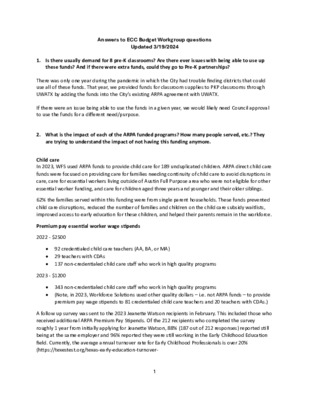Answers to ECC Budget Workgroup questions — original pdf
Backup

Answers to ECC Budget Workgroup questions Updated 3/19/2024 1. Is there usually demand for 8 pre-K classrooms? Are there ever issues with being able to use up these funds? And if there were extra funds, could they go to Pre-K partnerships? There was only one year during the pandemic in which the City had trouble finding districts that could use all of these funds. That year, we provided funds for classroom supplies to PKP classrooms through UWATX by adding the funds into the City’s exis�ng ARPA agreement with UWATX. If there were an issue being able to use the funds in a given year, we would likely need Council approval to use the funds for a different need/purpose. 2. What is the impact of each of the ARPA funded programs? How many people served, etc.? They are trying to understand the impact of not having this funding anymore. Child care In 2023, WFS used ARPA funds to provide child care for 189 unduplicated children. ARPA direct child care funds were focused on providing care for families needing con�nuity of child care to avoid disrup�ons in care, care for essen�al workers living outside of Aus�n Full Purpose area who were not eligible for other essen�al worker funding, and care for children aged three years and younger and their older siblings. 62% the families served within this funding were from single parent households. These funds prevented child care disrup�ons, reduced the number of families and children on the child care subsidy waitlists, improved access to early educa�on for these children, and helped their parents remain in the workforce. Premium pay essen�al worker wage s�pends 2022 - $2500 • 92 creden�aled child care teachers (AA, BA, or MA) • 29 teachers with CDAs • 137 non-creden�aled child care staff who work in high quality programs 2023 - $1200 • 343 non-creden�aled child care staff who work in high quality programs • (Note, in 2023, Workforce Solu�ons used other quality dollars – i.e. not ARPA funds – to provide premium pay wage s�pends to 81 creden�aled child care teachers and 20 teachers with CDAs.) A follow up survey was sent to the 2023 Jeanete Watson recipients in February. This included those who received addi�onal ARPA Premium Pay S�pends. Of the 212 recipients who completed the survey roughly 1 year from ini�ally applying for Jeanete Watson, 88% (187 out of 212 responses) reported s�ll being at the same employer and 96% reported they were s�ll working in the Early Childhood Educa�on field. Currently, the average annual turnover rate for Early Childhood Professionals is over 20% (htps://texestest.org/texas-early-educa�on-turnover- 1 rate/#:~:text=The%20situa�on%20is%20worse%20in,rate%2C%20with%20just%208%25) so this data helps reflect the program makes an impact on teacher and staff turnover. Addi�onal informa�on related to the availability of child care assistance for families and the context in which the ARPA funds are being deployed: • The Child Care Scholarship program through Workforce Solu�ons Capital Area is at capacity, enrollment is closed, and no new funding is available at this �me. • As of early January 2024, the es�mated amount of �me a family applying for a scholarship at that �me would likely remain on a waitlist before they could expect to be outreached for enrollment was 24 months. • The last �me WFS outreached any families on their waitlist was 3/24/2023, nearly a year ago. • All COA ARPA funds WFS has for direct child care are currently obligated. It is not clear that WFS will receive the second tranche of County ARPA funds. Pre-K • • In school year 2023-24, ARPA funds are providing free full-day Pre-K to 45 four-year-olds in DVISD who would otherwise not be eligible for free Pre-K and whose families cannot afford full- fee child care and live in a child care desert. (DVISD will expend all ARPA funds by the end of FY24, so this is the last school year this program will be funded.) In the school year 2023-24, AISD is using ARPA funds to extend free Pre-K from half-day to full day for 65 three-year-olds on four campuses. (Note, AISD’s remaining ARPA funds are sufficient to con�nue this program in the 2024-25 school year, and possibly through the 2025-26 school year.) Pre-K Partnership Management Hub With the help of ARPA funding, UWATX, serving as the management hub for Pre-K Partnerships had helped enroll 221 children in partnership classrooms in 2023. (The UWATX ARPA agreement, which funds 9 projects, including Pre-K Partnerships, will mostly likely be extended through 6/30/2025.) Child Care Leadership Development Using one-�me funding ($300K) from the Economic Development Department, Together for Children led a leadership training for child care administrators. 29 administrators completed the first cohort and the second and final cohort will serve 30 more this year. Family Connects APH used ARPA funds to help increase staff to expand postpartum nurse home visits to more families in Travis County. Up to now, ARPA has been suppor�ng salaries for 5 nurses and 2 Program Support Specialists. The rest of this year, ARPA will fund one nurse supervisor, 5 nurses, and 1 PSS (the others will shi� over to be funded by MIECHV). ARPA funding for salaries ends 12/31/2024. APH will be able to cover the salary of one of those nurses a�er ARPA beginning in January 2025 with a CDC Public Health 2 Infrastructure Grant. There is not currently funding iden�fied for the other ARPA funded staff beyond 2024, though APH is coordina�ng with Jessica Lucky at UWATX to look for funding that may be able to cover at least some of these posi�ons a�er this year (such as whether there will be a possibility of further expansion of MIECHV funding for Family Connects). Total number served ARPA Increase Year 2021 2022 2023 891 885 1088 200+ 270+ FC started spending in Dec 2021 on computers and then Temps started hi�ng the books in Jan 2022 3